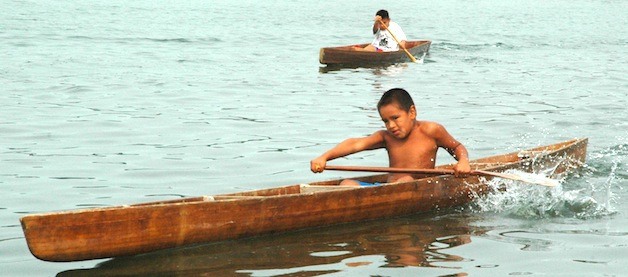TULALIP — Vancouver Island’s Bryce Edwards, 7, and Neah Bay’s Sophia Venske, 10, were among the boys and girls who led off the Tulalip Tribes’ first war canoe races in decades.
It was Bryce’s first year of canoeing, but he’d been competing every weekend since Mother’s Day, and winning his age category in most of them.
Like Sophia did for the girls, Bryce came in second for the 10-and-under category at Tulalip Aug. 22.
“It’s such a great thing for the kids,” said Rachel Venske, Sophia’s mom, who was joined by Sophia’s sister, Cei’j Gagnon, in helping launch Sophia’s canoe that afternoon.
Rachel began canoeing in 1994, while 13-year-old Cei’j started when she was 7. Sophia has been canoeing for two years.
None was canoeing the last time the tribes hosted war canoe races, which event organizers noted are a completely different activity from the annual canoe journeys through Puget Sound.
The last time Muffy Ordonia pulled as part of a canoe team was a quarter of a century ago. She began in the late 1970s, and although she only continued for a few years, it supplied her with a wealth of character-building experiences.
“It takes a lot of hard work and endurance,” said Ordonia, who still remembers how cold the water was. “I met a lot of good friends, and I loved being able to travel. I learned how to camp and make food for others. I did a lot of running, morning and night. You couldn’t have any soda pop. I didn’t know how to swim, so I learned how not to panic.”
Inez Bill, rediscovery coordinator for the Tulalip Tribes, agreed that canoe racing instills a sense of discipline in young people.
“It gets in your blood,” Bill said. “There’s a spiritual aspect to it. You learn to respect the water.”
Natasha Fryberg saw the canoe races as a means of promoting healthy activity and competition among tribal children, and enlisted the aid of Alicia Horne in helping to coordinate the event, close to four months beforehand.
“Kids learn that, if you don’t paddle together in a timely manner, you will tip over,” Horne laughed. “You have to switch sides at the same time. In the process, you get to know your fellow racers.”
Horne estimated that the two-day canoe races drew at least 150 participants, from Canada to the south of Puget Sound.
“It’s been a great turnout,” Horne said. “We’ve seen everyone from five-year-olds to grandparents. I have four children of my own, so this is a great opportunity for them.”
Tulalip Tribal chairman Mel Sheldon Jr. addressed the participants just before the races, acknowledging that this event is valuable for the ways in which it can help counteract recent tragedies to befall the tribes.
“This creates positive memories for our young ones,” Sheldon said. “They’re getting to know their cousins and neighbors from other communities, and building the strength and skills that will make them leaders in the future. By connecting parents and kids, it builds our families’ relationships.”
Indeed, as Bryce returned to shore, after crossing the finish line, his proud stepfather, Peter Seymour, called out to him, “Good job! You’re paying for your own buffet tonight, boy.”


